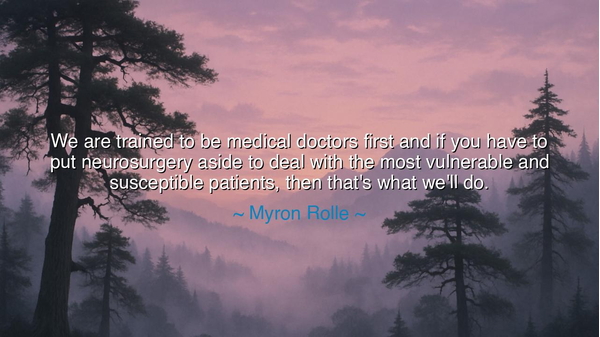
We are trained to be medical doctors first and if you have to put
We are trained to be medical doctors first and if you have to put neurosurgery aside to deal with the most vulnerable and susceptible patients, then that's what we'll do.






The words of Myron Rolle—“We are trained to be medical doctors first and if you have to put neurosurgery aside to deal with the most vulnerable and susceptible patients, then that’s what we’ll do”—speak to the sacred hierarchy of duty that lies at the heart of all true medicine. In these words burns the spirit of ancient healers who placed compassion above ambition, humanity above prestige. For in times of trial, when the suffering of others calls out like a cry from the battlefield, the true physician must lay aside even the instruments of mastery to serve where he is needed most. Rolle, both a neurosurgeon and a man of profound purpose, reminds us that healing is not a career—it is a calling.
In the great tradition of medicine, the ancients knew that the art of healing was not defined by specialization, but by devotion to life itself. The Greek physician Hippocrates, when faced with plague, did not choose whom to save based on skill or stature. He walked among the dying, cleansing wounds, comforting spirits, and standing as a bulwark between chaos and hope. So too does Rolle’s declaration echo this timeless creed: that when the world trembles, when the sick and poor fall through the cracks, the healer must descend from the tower of his craft and tend to the ground where humanity bleeds. To be a doctor first is to remember that knowledge is a tool, but compassion is the soul.
The story of Myron Rolle himself mirrors this truth. Once a scholar, athlete, and Rhodes Scholar, he trained in neurosurgery, one of the most exalted and demanding disciplines. Yet when the storms of pandemic swept across the earth, he stepped away from the surgical theater to join his fellow physicians on the front lines, caring for patients gasping for life in crowded wards. This act was not retreat but sacrifice—the kind of sacrifice that only the heart of a true healer can make. For in setting aside the brain, he chose to serve the breath, and in doing so, he embodied the ancient law of medicine: “First, do no harm—but when harm is done, stand beside those who suffer.”
To understand his words is to recognize the true hierarchy of virtue. Prestige fades, titles crumble, and fields of expertise come and go, but the moral duty of care endures. It is a reminder to all who seek greatness that greatness itself is meaningless if it cannot kneel. The surgeon’s hand that can repair the intricate pathways of the brain is no greater than the hand that wipes a fevered brow. Both serve the same divine purpose: to preserve life. And when the world demands humility, the true healer answers not with pride but with service.
There is a tale from the time of plague in medieval Europe, when the physicians of Paris fled the city in fear. But a small band of monks and midwives, untrained in anatomy but steadfast in compassion, remained. They fed the sick, prayed over the dying, and tended to the forgotten. Centuries later, historians found records of their deeds and called them the physicians of mercy. They did not bear diplomas, yet they upheld the spirit that Rolle now calls us back to—that in the face of vast suffering, to serve is the highest science.
In a modern age obsessed with specialization, we are often tempted to measure worth by expertise rather than empathy. But Rolle’s quote strikes at the heart of that illusion. To be “a doctor first” is to recall that every discipline, from neurosurgery to nursing, exists to uphold the same covenant: to protect the vulnerable. When that truth is forgotten, medicine becomes an industry; when it is remembered, medicine becomes a light. Thus, his words remind not only doctors, but all who serve others, that sometimes the highest form of mastery is the humility to pause one’s craft and extend one’s heart.
Let every listener of this teaching remember: in life, we too will face moments where our knowledge, status, or ambition must be set aside for something greater. When the cry of the weak reaches your ears, do not weigh it against your schedule or title—answer it. Be as Rolle teaches: a servant of humanity before a servant of self. For it is in those moments of surrender that the soul becomes strongest, and the work of one person becomes the healing of many.
And so, from the wisdom of Myron Rolle, let this truth be written upon the tablets of time: that the worth of a healer is not in the brilliance of their skill, but in the depth of their compassion. To set aside glory for service is the most sacred act a human being can perform. For when the learned bow before the suffering, the world itself begins to heal.






AAdministratorAdministrator
Welcome, honored guests. Please leave a comment, we will respond soon